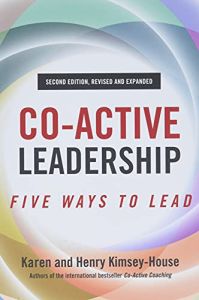Join getAbstract to access the summary!

Join getAbstract to access the summary!
Karen Kimsey-House and Henry Kimsey-House
Co-Active Leadership
Five Ways to Lead, Second Edition
Berrett-Koehler, 2021
What's inside?
Co-active leadership means helping everyone, including yourself, succeed with values-based collaboration.
Recommendation
In teaching co-active leadership, which emphasizes helping others, Karen and Henry Kimsey-House stress knowing yourself and building enduring relationships. The authors say that “co” refers to life’s interdependent, communal, responsive aspects, and “active” covers what each individual should do. Their leadership model assigns five necessary dimensions to management and leadership to help you take a humane, values-based approach.
Summary
About the Authors
Karen and Henry Kimsey-House co-founded the Co-Active Training Institute in 1992; today it reaches thousands of people worldwide.



















Comment on this summary